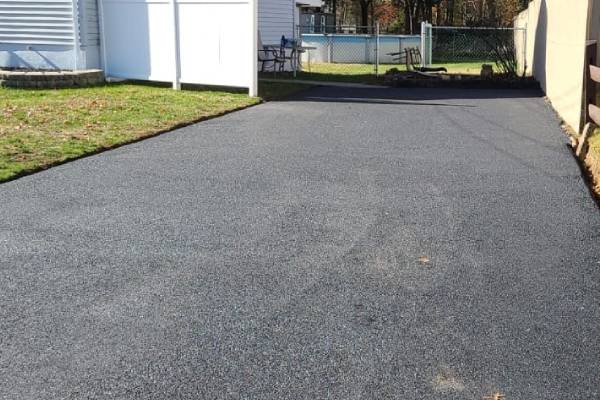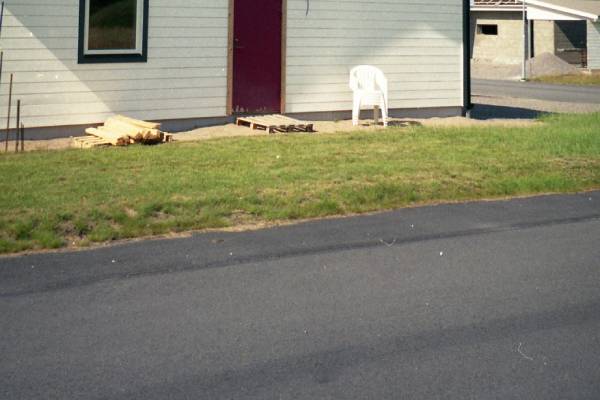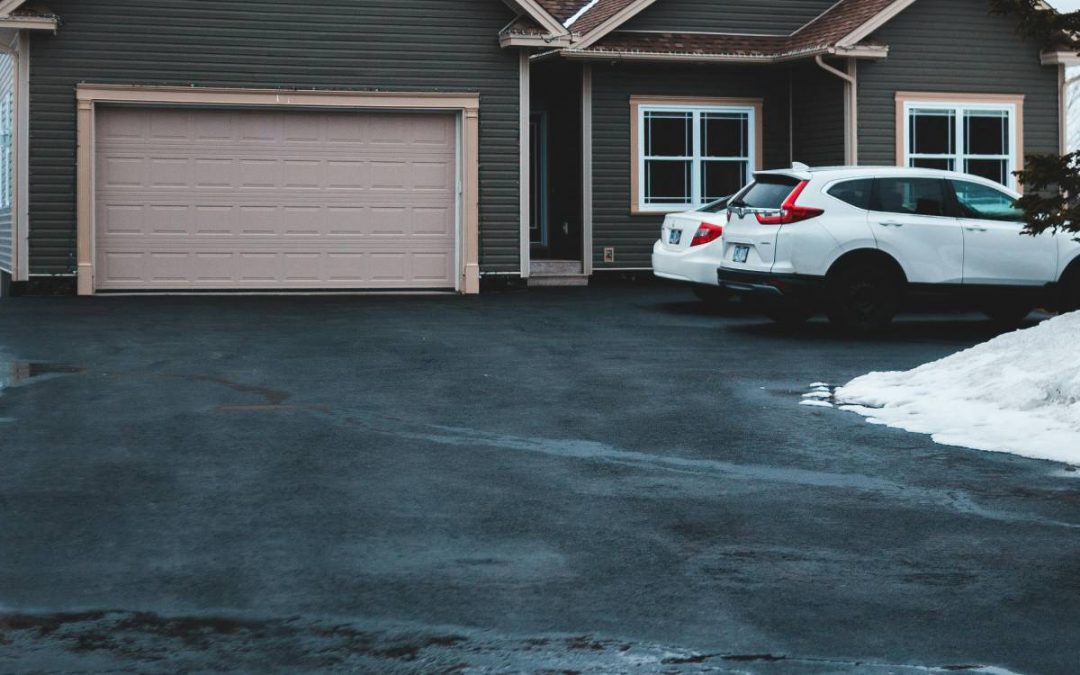Asphalt driveways offer a smooth, durable surface that many Long Island homeowners prefer. Asphalt is an extremely common paving material – in fact, more than 90% of U.S. paved roads use asphalt- and that popularity extends to residential driveways. Choosing the right driveway material is crucial: it affects curb appeal, durability, maintenance costs, and the resale value of a home. Homeowners should compare options like concrete, gravel, and pavers on cost, longevity, and climate performance before deciding. An experienced Long Island paving contractor knows that asphalt often wins on balance.
What Is Asphalt Paving?
Asphalt paving uses a mixture of stone, sand, and bitumen (a petroleum binder) to create a solid surface. This material is laid hot in layers over a compacted base and then smoothed and rolled. The result – often called blacktop – is a continuous, impermeable surface that is ready for traffic in days, not weeks. Asphalt paving can be customized (for example, with colored or stamped asphalt) but usually remains a sleek black. Local asphalt contractors are skilled at installing proper bases and drainage, ensuring the driveway stays level and lasts for decades.
Why Driveway Material Choice Matters for Homeowners

The choice of driveway material has real impacts on homeownership. A driveway influences first impressions and property value. It also dictates long-term maintenance: a cheap material may break down quickly, while an expensive one might last longer but cost more upfront. Climate matters too – a rigid concrete slab might crack in freeze-thaw cycles, whereas a flexible asphalt surface can adapt better. Ultimately, homeowners should weigh factors like installation cost, lifespan, maintenance needs, and aesthetic goals. In Long Island’s varying climate, asphalt often offers a good balance of these factors.
Common Alternatives to Asphalt
-
Concrete: Made from cement and aggregates, concrete driveways are strong and can last 30-40 years with few repairs. They can be stamped or colored for design variety. However, concrete is expensive (often $14-$25 per sq ft) and prone to visible cracking in harsh weather. Oil stains are harder to remove on concrete, and repairs can be costly.
-
Gravel: Gravel or crushed stone driveways have the lowest upfront cost (as little as $1-2 per sq ft). But they require frequent upkeep: stones must be replenished every few years, and ruts or holes can form easily. Gravel can also shift during winter snow removal and muddy when it rains. Despite being affordable initially, long-term maintenance can become labor-intensive.
-
Pavers (interlocking or cobblestone): Pavers come in many styles and colors and are extremely durable (lasting 50+ years if set on a strong base). They allow custom designs and easy spot repairs (individual pavers can be replaced). The downside is cost: pavers often run $19-$30 per sq ft or more, plus intensive base work. For typical homeowners, that high price makes pavers a luxury choice rather than a budget-friendly driveway.
Each alternative has its place, but for most Long Island residential driveways, asphalt often provides the best mix of performance and value.
Common Myths and Misconceptions About Asphalt Driveways

“Asphalt Doesn’t Last as Long as Concrete” – Truth vs. Myth
It’s true that concrete is generally more rigid and can have a longer natural lifespan (30-40 years vs. 20-30 for asphalt). However, asphalt’s flexibility and ease of repair can offset that difference. With regular upkeep (sealcoating and repairs), a well-installed asphalt driveway can approach concrete’s longevity at a much lower cost. Unlike concrete, asphalt can be resurfaced or patched quickly, making small cracks and damage virtually invisible. In many cases, an older asphalt driveway can be revitalized with just a fresh top layer, whereas a cracked concrete slab often must be completely replaced.
“Sealcoating Is Optional” – Why It’s Not
Skipping sealcoating on asphalt is a false economy. Sealcoat (a protective oil-based spray) shields asphalt from the sun’s UV rays and water damage. Without it, asphalt oxidizes and becomes brittle, leading to cracks. Industry experts advise sealcoating roughly every 2-4 years for residential driveways. In fact, sealcoating is so important that professional contractors consider it routine maintenance. Ignoring sealcoating accelerates deterioration and can cut an asphalt driveway’s life short. By contrast, properly sealcoated asphalt can stay supple and crack-resistant between major repairs.
“Asphalt Is Only for Commercial Roads” – Residential Benefits
Another myth is that asphalt is only suitable for highways or parking lots. In reality, asphalt driveways are extremely popular for homes. They offer a clean, modern look and are fully compatible with residential landscapes. In snowy or rainy weather, asphalt performs well – its dark color helps melt snow faster and its permeability options manage runoff effectively (more below). Many Long Island paving companies and residential paving contractors favor asphalt for these reasons. Modern asphalt mixes can even be “engineered for homes,” with additives to improve durability in cold climates. So while highways do use asphalt, homeowners reap similar benefits: cost-effective installation, proven durability, and a sleek finished look.
Asphalt vs. Other Driveway Materials
Asphalt vs. Concrete Driveways – Cost, Lifespan & Aesthetics
-
Cost: Asphalt is typically much cheaper to install than concrete. Current estimates show asphalt installations around $7–$13 per square foot (materials and labor included). By comparison, a typical concrete driveway often costs around $14–$25 per square foot or more (depending on finish and region). That makes asphalt roughly half the cost of concrete in many cases. Lower initial cost means homeowners can invest in extra features (like better base work) or allocate budget elsewhere.
-
Lifespan: As noted, concrete may technically last longer (up to 30–40+ years). However, even 20–30 years for asphalt is quite durable for a driveway. More importantly, asphalt’s life can be extended easily – cracks are filled and surfaces are sealed, whereas concrete cracks are permanent. Many Long Island contractors will tell you that an asphalt driveway “designed right” can serve a family for decades with minimal fuss. (Plus, if a section does fail, asphalt repairs are quick and invisible.)
-
Aesthetics: Fresh asphalt is smooth and deep black, giving a neat, uniform appearance that boosts curb appeal. Concrete can be poured in slabs or stamped/stained for design options (like faux brick patterns), but those often cost extra. One downside of concrete is it can discolor or show stains more easily. Asphalt, especially when freshly paved, has a clean look that many find attractive. Note that asphalt can also be customized: it can be poured hot with colored stones or even stamped (less commonly) to resemble patterns. Overall, asphalt’s sleek dark surface tends to look modern and well-kept, especially after a new sealing coat.
Asphalt vs. Gravel Driveways – Maintenance and Stability
Smooth asphalt pavements are vastly more stable and low-maintenance than gravel. A gravel driveway may seem low-tech, but it requires a lot of upkeep: raking, topping up stones every winter, and leveling out ruts after heavy use. In contrast, an asphalt driveway remains level and solid under vehicles, making snow shoveling or plowing much easier. In fact, one home improvement guide notes that a well-maintained asphalt drive can last 20–30 years (with routine sealing and repairs), whereas a gravel drive needs its crushed stone replaced every 1–3 years to stay smooth. The time and effort saved on winter cleanup and annual re-graveling often justify the asphalt’s higher upfront cost.
The smooth black surface of a new asphalt driveway can significantly enhance curb appeal. Its uniform look is neat and fresh, and the dark color even helps melt snow and ice faster than lighter pavements.
Asphalt vs. Paver Driveways – Design Options and Pricing
Interlocking pavers offer the most design variety (colors, shapes, patterns) and can be extremely long-lasting. However, these benefits come with a high price tag: well over $20 per square foot installed in many areas. Asphalt, by contrast, is very budget-friendly and still offers some design features (like colored or “stamped” blacktop for a textured look). For most homeowners on Long Island, pavers are considered a luxury upgrade. Asphalt is often the economical choice that still looks good. And while a paver can be lifted and replaced piecemeal, asphalt repairs (though visible upon close inspection) can be nearly seamless with professional patching and sealcoating.
Which Option Is Best for Long Island Homeowners?
Local climate considerations: Long Island has cold winters (often with snow) and humid summers. Asphalt is well-suited for freeze-thaw cycles because it can flex rather than shatter. Industry sources note that asphalt will expand and contract with seasonal changes, preventing large cracks that concrete might suffer. (Asphalt pavement can be engineered with flexible binders to handle cold; concrete cannot move as easily.) Importantly, asphalt surfaces tolerate salt and de-icers much better: salt does not deteriorate the bitumen binder, whereas it can etch and weaken concrete. This means Long Island drivers can salt an asphalt driveway without worrying about chemical damage. Also, the dark asphalt will warm up more in winter sunlight, hastening snow melt – a practical benefit in our snowy season.
Budget considerations: Asphalt is usually cheaper, meaning more value for Long Island homes where budget is always a factor. Even on a tight budget, asphalt can be installed quickly by local asphalt contractors, and still provide decades of service if maintained.
Resale and curb appeal: A fresh black asphalt driveway is attractive to many buyers. It gives homes a modern look, and for some, a well-maintained asphalt drive suggests “no-hassle maintenance” compared to gravel. And unlike concrete that can look age-worn, an asphalt driveway can be resealed to appear nearly new, which can impress prospective buyers.
Overall for Long Island homeowners, asphalt often wins as the best driveway material: it handles weather, won’t bankrupt you, and still looks great. Local paving experts like Islandwide Paving & Masonry frequently recommend asphalt driveways for just these reasons.
Key Benefits of Choosing Asphalt Driveways
-
Cost-Effective Installation: Asphalt is a low-cost solution. For example, one estimate puts a new asphalt driveway at only $7–13 per square foot all-in (materials and labor). By comparison, concrete driveways often cost two to three times as much. Asphalt’s affordability allows homeowners to get a high-quality base and professional installation without breaking the bank.
-
Faster Installation Time: Because asphalt is laid hot and cures quickly, an average asphalt driveway can be installed in a day or two. It is typically ready for light use within about 24–48 hours. Concrete, on the other hand, can take 7–10 days to fully cure before use. This means less disruption: families and businesses have minimal downtime waiting for their driveway. Local asphalt contractors pride themselves on turning around home driveways quickly, even paving a standard driveway in a single day.
-
Long-Lasting Durability Under Daily Traffic: Properly installed asphalt withstands cars, trucks, and daily foot traffic very well. The flexible stone-and-bitumen mix resists rutting under heavy vehicles and holds up under frequent use. With routine maintenance, an asphalt drive can remain serviceable for decades. It’s common to see asphalt roads handle much heavier loads (buses, dump trucks, etc.) than any home driveway, which underscores its strength. For a residential driveway, that durability means fewer worry about potholes forming under the car’s weight.
-
Smooth, Sleek Appearance That Boosts Curb Appeal: A freshly paved asphalt driveway looks clean and professional. Its deep black color creates a uniform, modern look (). This sleek appearance can greatly enhance a home’s curb appeal. In fact, local paving experts note that simply repaving and sealcoating an existing asphalt drive can make an older home look more cared-for. As one source remarks, even fixing cracks and resealing can “add to your home’s curb appeal”. In short, homeowners love how an asphalt driveway makes the property stand out with a tidy, finished look.
-
Low Maintenance and Easy Repairs: Asphalt is very forgiving to fix. Small cracks and holes can be filled with hot patch within hours. Large damaged sections can be milled out and re-paved, often blending in nearly invisibly after sealcoating. In general, maintenance is simple: clean the surface, fill cracks when they appear, and sealcoat every few years. This is far easier than repairing concrete (which requires specialized equipment) or re-leveling gravel. Importantly, using salt or de-icers in winter won’t damage asphalt, so you can keep driveways clear without fear. When problems do arise, asphalt patches are quick and relatively inexpensive.
-
Better Performance in Cold and Wet Weather: Asphalt is engineered for winter. The material remains flexible at lower temperatures, so freeze-thaw cycles (common on Long Island) are less damaging than they would be to rigid concrete. Asphalt’s dark color also means it absorbs heat: studies show asphalt melts snow faster than lighter materials. This not only improves safety but can reduce the amount of salt needed. Additionally, asphalt is not harmed by water if properly sealed, whereas water intrusion can crack concrete. An asphalt driveway laid with good drainage won’t pool water or trap ice. In short, asphalt withstands wet weather and icy conditions better than many homeowners realize.
-
Flexible Material Reduces Cracking Over Time: Finally, the asphalt mix is somewhat elastic thanks to the bitumen binder. This flexibility allows the pavement to expand and contract with temperature shifts and slight ground movements without shattering. As one expert notes, “asphalt is flexible and can expand and contract with seasonal changes,” unlike concrete which tends to crack when pushed. In practice, this means an asphalt driveway typically develops only fine cracks (which are easy to seal), rather than the larger structural cracks common in concrete. Over time, that flexibility keeps the surface together longer.
Maintenance Tips to Extend the Lifespan of Your Asphalt Driveway
Proper care will keep an asphalt driveway looking good and lasting as long as possible. Here are recommended maintenance practices:
-
Regular Sealcoating: Apply a high-quality asphalt sealcoat every 2–3 years. Sealcoating protects the surface from UV oxidation, oil spills, and water intrusion. Industry guidelines emphasize timely sealcoating; skipping this step will let the asphalt become brittle and crack. Sealing a driveway is relatively inexpensive compared to major repairs, and it keeps the pavement flexible longer.
-
Crack Filling and Patching: Inspect the driveway annually and fill any small cracks with asphalt crack filler. Fill potholes or depressions promptly with hot patch or a resurfacing overlay. Water is the enemy – a small crack can let water in and eventually turn into a pothole. By catching cracks early, you prevent bigger damage. (Tip: do crack sealing in cooler, dry conditions so the filler sets correctly.)
-
Proper Cleaning and Drainage: Keep the surface clean of debris, oil, and excess vegetation. Use a stiff broom or pressure washer to clear leaves and dirt. Check that drains and slopes direct water away from the driveway. Standing water can weaken the edges of asphalt, so ensure gutters and nearby landscaping don’t send runoff onto the pavement. Good drainage is key: consider adding gravel or drains if runoff pools at the driveway ends.
-
Seasonal Care – Summer vs. Winter: In summer, avoid pouring gasoline, oil, or harsh chemicals on the asphalt, as they can damage the binder. If spills happen, clean them up quickly. In winter, remove snow promptly and use salt or calcium chloride to prevent ice – these will not harm asphalt as they do concrete. However, use only moderate amounts of de-icer (any de-icer is somewhat harmful to the environment), and consider pet-safe salts if needed. After winter, sweep or wash the driveway to remove sand/salt residue. Performing maintenance appropriate to each season (like not sealing in freezing weather, and not snow-blowing too aggressively) will maximize the pavement’s life.
Environmental and Practical Advantages
-
Recyclable and Eco-Friendly: Asphalt is the most recycled material in America. According to federal data, 73 million tons of asphalt are reclaimed each year, and about 80% of removed asphalt gets reused in new paving. In fact, nearly 95% of new asphalt pavement projects incorporate recycled asphalt pavement (RAP). This means an asphalt driveway inherently supports circular economy practices. Using reclaimed asphalt reduces landfill waste and the need for new raw materials. When a driveway is replaced, the old asphalt is usually taken to a facility and ground up as aggregate – nothing is wasted.
-
Energy Efficiency (Warm Mix Asphalt): Newer asphalt technologies further cut environmental impact. Warm-Mix Asphalt (WMA) is becoming common; this technique lowers production temperatures by about 50°F. Lower temps mean 30% less energy used in the plant and far fewer emissions. Some asphalt companies now offer WMA for driveways, which reduces greenhouse gas output during installation. So an asphalt driveway can be installed with a smaller carbon footprint than before.
-
Water Drainage and Permeability Benefits: Standard asphalt is impermeable, but permeable (porous) asphalt options exist for driveways if stormwater is a concern. Porous asphalt lets rain and snow seep through gaps in the pavement into a stone reservoir below. The FHWA notes that porous asphalt provides a cost-effective, environmentally friendly stormwater solution, capturing runoff on-site. The EPA also highlights permeable asphalt as a best practice to reduce runoff and filter pollutants. For Long Island homes prone to heavy rains or flooded yards, a porous asphalt drive can mitigate drainage issues. (Note: porous asphalt requires a suitable base and subsoil.) In general, even regular asphalt can be pitched and edged to channel water off the surface effectively.
-
Heat Retention for Snow/Ice Melting: Asphalt’s dark color is often called a benefit in winter. Studies and industry experts explain that black asphalt absorbs solar heat, which warms the surface and melts snow and ice faster than lighter materials. This natural heat retention can reduce the amount of manual snow removal needed after sunny winter days. (It also reduces glare in bright sunlight.) Faster melting improves safety by shortening icy periods. In practice, an asphalt driveway will clear sooner on a sunny winter morning than a concrete or paver driveway under the same conditions.
By choosing asphalt, homeowners select a material that not only performs well but also aligns with sustainability goals. Modern asphalt paving is highly recycled, energy-conscious, and even helps manage water. That said, a good installation by a qualified local paving contractor is key to reaping these benefits.
Conclusion
For most Long Island residential properties, an asphalt driveway is an excellent choice. It offers great value for the money (low installation cost, long service life), strong performance (handles traffic and weather reliably), and minimal maintenance compared to many alternatives. Modern asphalt paving can even be tailored for eco-friendliness and quick snow melt. Local experts from Islandwide Paving & Masonry, a top asphalt paving company on Long Island, know how to design and install driveways that meet these real-world needs.
Homeowners interested in upgrading or replacing a driveway are encouraged to request a quote from Islandwide Paving & Masonry. Their experienced team can evaluate your property, recommend the best driveway material (often asphalt), and provide a detailed estimate. With their professional service, you can enjoy the smooth, attractive surface and long-term savings that come with an asphalt driveway. Contact Islandwide Paving & Masonry today for a free driveway paving estimate and see firsthand why asphalt is the preferred choice for Long Island homes.

